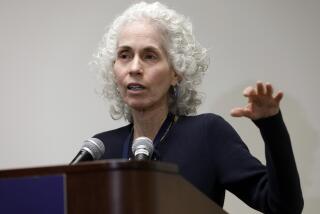Bill on Malpractice Disclosure Approved
The Legislature gave its approval Thursday to a bill requiring some public disclosure, for the first time, of doctors’ medical malpractice settlements.
The bill, which heads to the governor’s desk, would require the Medical Board of California to disclose information about physicians’ legal history, in addition to education and license status, to help patients research doctors.
If the measure becomes law, it would require the medical board to publish settlements on its Web site if a physician in a “low-risk” specialty, such as family practice, has three or more settlements of more than $30,000 in a 10-year period. Doctors in a “high-risk” specialty, such as neurology, would need four or more settlements to trigger disclosure.
The board would not be allowed to disclose the dollar amount of settlements, but would instead indicate whether the settlement is below average, average or above average compared with other doctors in the same specialty.
The bill, by Sen. Liz Figueroa (D-Fremont), would only apply to settlements in the future, not in the past.
The medical board presently does not disclose settlement information; such deals are often sealed. Under existing law, only court judgments against doctors must be disclosed to the public.
Lawmakers found that most complaints to the medical board filed by the public were closed without a formal investigation, and that 65% of those who complained were dissatisfied with the board’s action.
Also, the number of disciplinary actions taken by the board has fallen even as complaints increased.
The disclosure bill, supported by consumer groups, was opposed by medical malpractice insurers who felt it would discourage doctors from settling cases out of fear that such information would be made public.
Among other things, the legislation would require the medical board to give priority to investigations of cases in which a patient was harmed or died as a result of perceived physician misconduct.
More to Read
Get the L.A. Times Politics newsletter
Deeply reported insights into legislation, politics and policy from Sacramento, Washington and beyond. In your inbox three times per week.
You may occasionally receive promotional content from the Los Angeles Times.










